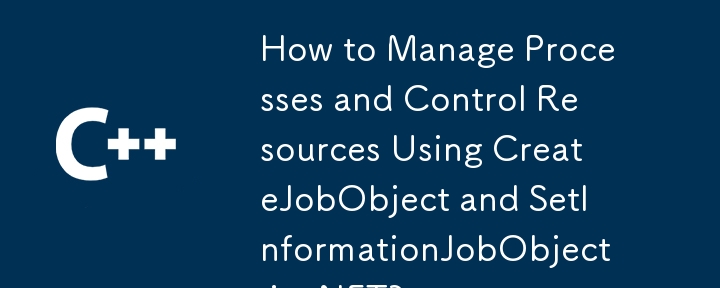Home >Backend Development >C++ >How to Manage Processes and Control Resources Using CreateJobObject and SetInformationJobObject in .NET?
How to Manage Processes and Control Resources Using CreateJobObject and SetInformationJobObject in .NET?
- Susan SarandonOriginal
- 2024-12-29 19:47:15592browse

How to Use CreateJobObject and SetInformationJobObject with P/Invoke in .NET
CreateJobObject and SetInformationJobObject are Win32 functions that allow you to manipulate job objects. Job objects are a mechanism for managing groups of processes and controlling their resources. They can be used to create a variety of effects, such as preventing processes from terminating each other or limiting their access to resources.
To use CreateJobObject and SetInformationJobObject with P/Invoke in .NET, you will need to declare the following functions and structures:
[DllImport("kernel32.dll", CharSet = CharSet.Unicode)]
static extern IntPtr CreateJobObject(IntPtr a, string lpName);
[DllImport("kernel32.dll")]
static extern bool SetInformationJobObject(IntPtr hJob, JobObjectInfoType infoType, IntPtr lpJobObjectInfo, UInt32 cbJobObjectInfoLength);
[DllImport("kernel32.dll", SetLastError = true)]
static extern bool AssignProcessToJobObject(IntPtr job, IntPtr process);
[DllImport("kernel32.dll", SetLastError = true)]
[return: MarshalAs(UnmanagedType.Bool)]
static extern bool CloseHandle(IntPtr hObject);
private IntPtr handle;
private bool disposed;
The CreateJobObject function creates a new job object. The SetInformationJobObject function sets information for a job object. The AssignProcessToJobObject function assigns a process to a job object. The CloseHandle function closes a handle to a job object.
The following code sample shows you how to use these functions to create a job object, set its information, and assign a process to it:
using System;
using System.Diagnostics;
using System.Runtime.InteropServices;
namespace JobManagement
{
public class Job : IDisposable
{
public Job()
{
handle = CreateJobObject(IntPtr.Zero, null);
var info = new JOBOBJECT_BASIC_LIMIT_INFORMATION
{
LimitFlags = 0x2000
};
var extendedInfo = new JOBOBJECT_EXTENDED_LIMIT_INFORMATION
{
BasicLimitInformation = info
};
int length = Marshal.SizeOf(typeof(JOBOBJECT_EXTENDED_LIMIT_INFORMATION));
IntPtr extendedInfoPtr = Marshal.AllocHGlobal(length);
Marshal.StructureToPtr(extendedInfo, extendedInfoPtr, false);
if (!SetInformationJobObject(handle, JobObjectInfoType.ExtendedLimitInformation, extendedInfoPtr, (uint)length))
throw new Exception(string.Format("Unable to set information. Error: {0}", Marshal.GetLastWin32Error()));
}
public void Dispose()
{
Dispose(true);
GC.SuppressFinalize(this);
}
private void Dispose(bool disposing)
{
if (disposed)
return;
if (disposing) { }
Close();
disposed = true;
}
public void Close()
{
CloseHandle(handle);
handle = IntPtr.Zero;
}
public bool AddProcess(IntPtr processHandle)
{
return AssignProcessToJobObject(handle, processHandle);
}
public bool AddProcess(int processId)
{
return AddProcess(Process.GetProcessById(processId).Handle);
}
}
#region Helper classes
[StructLayout(LayoutKind.Sequential)]
struct IO_COUNTERS
{
public UInt64 ReadOperationCount;
public UInt64 WriteOperationCount;
public UInt64 OtherOperationCount;
public UInt64 ReadTransferCount;
public UInt64 WriteTransferCount;
public UInt64 OtherTransferCount;
}
[StructLayout(LayoutKind.Sequential)]
struct JOBOBJECT_BASIC_LIMIT_INFORMATION
{
public Int64 PerProcessUserTimeLimit;
public Int64 PerJobUserTimeLimit;
public UInt32 LimitFlags;
public UIntPtr MinimumWorkingSetSize;
public UIntPtr MaximumWorkingSetSize;
public UInt32 ActiveProcessLimit;
public UIntPtr Affinity;
public UInt32 PriorityClass;
public UInt32 SchedulingClass;
}
[StructLayout(LayoutKind.Sequential)]
public struct SECURITY_ATTRIBUTES
{
public UInt32 nLength;
public IntPtr lpSecurityDescriptor;
public Int32 bInheritHandle;
}
[StructLayout(LayoutKind.Sequential)]
struct JOBOBJECT_EXTENDED_LIMIT_INFORMATION
{
public JOBOBJECT_BASIC_LIMIT_INFORMATION BasicLimitInformation;
public IO_COUNTERS IoInfo;
public UIntPtr ProcessMemoryLimit;
public UIntPtr JobMemoryLimit;
public UIntPtr PeakProcessMemoryUsed;
public UIntPtr PeakJobMemoryUsed;
}
public enum JobObjectInfoType
{
AssociateCompletionPortInformation = 7,
BasicLimitInformation = 2,
BasicUIRestrictions = 4,
EndOfJobTimeInformation = 6,
ExtendedLimitInformation = 9,
SecurityLimitInformation = 5,
GroupInformation = 11
}
#endregion
}
This code sample creates a job object, sets its information to prevent processes from terminating each other, and assigns the current process to the job object.
The above is the detailed content of How to Manage Processes and Control Resources Using CreateJobObject and SetInformationJobObject in .NET?. For more information, please follow other related articles on the PHP Chinese website!
Related articles
See more- C++ compilation error: A header file is referenced multiple times, how to solve it?
- C++ compilation error: wrong function parameters, how to fix it?
- C++ error: The constructor must be declared in the public area, how to deal with it?
- Process management and thread synchronization in C++
- How to deal with data splitting problems in C++ development

